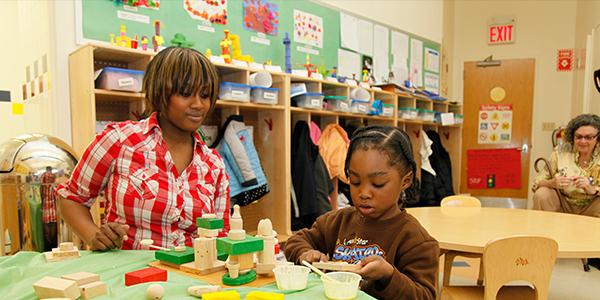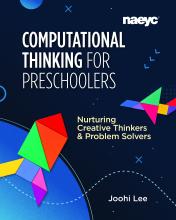Computational Thinking for Preschoolers: Nurturing Creative Thinkers and Problem Solvers

Big Thinking for Little Thinkers
Computational thinking (CT) helps young children make sense of problems, recognize patterns, and plan solutions. These early thinking skills, like curiosity, logic, and creativity, help children make sense of their world and lay the groundwork for future learning. When educators nurture CT through play and exploration, they help children develop confidence as thinkers and problem solvers.
Inside you’ll gain:
- Clear explanations of the four core CT skills: decomposition, pattern recognition, abstraction, and algorithmic thinking, and how they appear in play and problem-solving
- Practical examples for integrating CT into storytelling, routines, and learning centers
- Guidance for introducing coding and sequencing concepts through hands-on, screen-free activities
- Reflection prompts and next steps to strengthen practice and communicate the value of CT to families and colleagues
Grounded in research and real classroom practice, Computational Thinking for Preschoolers bridges the gap between theory and practice, giving educators the tools and confidence to bring computational thinking to life. With clear guidance and ready-to-use ideas, it turns everyday play into purposeful exploration that sparks curiosity, deeper thinking, and powerful problem solving.
Additional Information
Table of Contents
- About the Author
- Acknowledgments
-
Introduction
- Who Is This Book For?
- About the Book
-
Chapter 1: Computational Thinking in Early Childhood
- What Computational Thinking Is and Its Origins
- Debunking Myths About Computational Thinking
- Major Computational Thinking Skills and Their Use in Problem Solving
-
Computational Thinking in Action in a Preschool Setting
- Creating Teachable Moments to Address Challenges
- Enhancing Children’s Success in Problem Solving
- Conclusion
-
Chapter 2: A Closer Look at Computational Thinking Skills
- Understanding Connections to the Cognitive and Social and Emotional Domains
-
Computational Thinking Skills
- Decomposition
- Pattern Recognition
- Abstraction
- Algorithmic Thinking
- When to Step Back and When to Step In
-
Questions as Tools to Enhance Children’s Computational Thinking
- Questions That Encourage Problem Solving
- Questions That Involve Ordinal Language
- Questions That Incorporate Locational and Directional Language
- Questions That Encourage Children’s Expression of Thought
- Conclusion
-
Chapter 3: Unplugged Learning Experiences
-
Daily Routines
- Morning Circle or Whole Group Time
- Snack Time
- Cleanup Time
-
Learning Centers and Other Areas in the Early Learning Setting
- Literacy Learning Center
- Math Learning Center
- Block Center
- Science Learning Center
- Dramatic Play Center
- Art Learning Center
- Outdoor Play Area
-
Targeted CT Learning Experiences
- I’m a Robot and I’m a Programmer
- Mystery Bag
- The Fastest Way
- Secret Codes
- Mapping and Treasure Hunting
- Conclusion
-
Daily Routines
-
Chapter 4: Coding Using Stories as a Framework
- Making Coding Meaningful in Early Childhood
-
How to Code Using Stories
- Step One: Select or Create a Story
- Step Two: Create a Picture Card for Each Major Narrative Event
- Step Three: Arrange the Picture Cards to Establish the Narrative’s Sequence
- Step Four: Create a Coding Grid
- Step Five: Place the Picture Cards on the Coding Grid in a Random Order
- Step Six: Navigate a Pathway on the Coding Grid
-
CT Terms and Other Language Commonly Used When Coding Using Stories
- Sequential Words
- Directional Words
- Algorithm
- Debug
- Loop
-
Ideas for Extending This Learning Experience
- Local Maps
- Programmable Robots
- Block-Based Coding Programs
- Conclusion
-
Chapter 5: What’s Next? Calls to Action for Educators
-
Keep Learning and Growing
- Practice Effective Strategies
- Improve Through Professional Development
-
Create Opportunities for Education and Connection
- Partner with Families
- Involve the Community
-
Advocate for Computational Thinking
- Collaborate with Administrators
- Engage with Policymakers
- Conclusion
-
Keep Learning and Growing
- References
- Index
Book Details
Joohi Lee, PhD, is professor of early childhood mathematics education in the Department of Teacher and Administrator Preparation at the University of Texas at Arlington (UTA). With nearly 20 years of dedicated service at UTA, Dr. Lee has been instrumental in preparing preservice and in-service teachers for excellence in early childhood education, especially in early childhood mathematics pedagogy courses. Before joining UTA, she worked as a classroom teacher and early mathematics consultant, experiences that continue to inform her teaching and research. Her primary research interests focus on early mathematics education, teacher education in early childhood, and children’s computational thinking. Additionally, Dr. Lee explores innovative intersections of coding and robotics with children’s logical mathematical and computational thinking.

